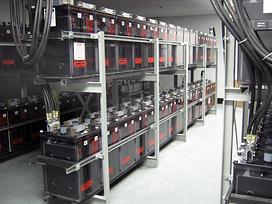The battery is the most vulnerable part of any uninterruptible power supply (UPS) system, it is ultimately at the heart of the UPS in terms of reliability. Understanding causes of UPS battery degradation, ways to prevent degradation and maintenance options are fundamental to ensure maximum system availability and are key to data center maintenance.
There are a few ways to extend the life of your data center UPS batteries and I'll talk about them here:
- Purchase the correct battery for your data center – There are many things that factor into the purchase of UPS batteries such as life expectancy, front or top access, voltage, capacity as well as other considerations. Be aware of these, for instance a VLRA (Valve Regulated Lead Acid) battery, while relatively low in cost, has low reliability. While a Flooded or Wet cell battery is much more expensive, it will give you the best reliability and a long service life.
- Is the battery manufacturer qualified by the major UPS manufacturers - Companies like Eaton/Powerware and Liebert/Emerson have qualified battery manufacturers they use for their UPS systems. These battery manufacturers include: C&D, Power Battery, GNB and Enersys.
- Is the battery fresh or surplus stock that has been sitting on a shelf - Batteries should not stay longer than six (6) months without recharging. Many times when you see a cheaper price it’s due to the need to move these off the shelf. It is difficult and labor intensive to charge pallets of them and if the batteries stay on the shelf too long they will need to be scrapped. Bottom line; make sure the da
 te codes on the batteries are within six months from the date you received them. Otherwise you may be getting a five year product that is a year or more old.
te codes on the batteries are within six months from the date you received them. Otherwise you may be getting a five year product that is a year or more old. - Install, manage and maintain batteries properly – Proper installation of the batteries is important and if not done correctly can lead to shortened battery life. These batteries are sensitive to room temperature, so a good maintenance practice is to keep them as close as possible to 77 degrees Fahrenheit. You need to make sure they are all kept as close to this temperature as possible so that some batteries don’t age faster than others, this can make the batteries die quicker.
- Make sure you have regular inspections of your batteries - the visual portion can unveil problems such as damaged or leaking post seals that can lead to corrosion or fires. Taking readings will tell you if one or more is not operating correctly due to a variety of reasons. A short within a cell will cause a lower float voltage on a battery. A battery with an open cell or low capacity may have a higher float voltage on it. The main problem is if one battery in a string that is wired in series (typical UPS application) starts to fail or fails it will affect the remaining batteries.
- Keep an eye on the battery's discharge status - if a battery isn’t recharged within 48 hours it can lead to damage.
Submitted by Paul Iodice, Power Electronics Supervisor - Electronic Environments Corporation

